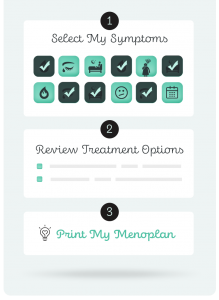Symptoms
WHAT IS IT?
With dry eye disease, the eyes have trouble making tears and other coatings that keep the surface of your eye moist. People with dry eye disease may feel discomfort, a burning sensation, or sensitivity to light. It may feel gritty, or like there’s something in their eye. Vision may get blurry. Sometimes the eye reacts by becoming watery. The eyes may tire easily. Dry eye disease is a common reason for seeing a health care provider or an eye doctor (ophthalmologist).
It’s important to address chronic dry eye. Untreated, it may lead to poorer vision.
WHAT’S HAPPENING TO MY BODY?
Our eyes are coated by a thin layer of tears. Tears are made of oil, mucus, and a watery layer. During the menopause transition, the tear layer may evaporate faster leading to dry eyes. The decrease in hormones like estrogen and testosterone during the transition and afterwards affects the ability of special glands (the meibomiun glands) to make an oil that helps prevent tears from evaporating. With less oil, the eyes dry out more easily. Chronic dry eye may damage these glands, so it is important to pay attention and have it addressed.
WHAT TO EXPECT
The risk for dry eye and gland dysfunction increases once you enter the menopause transition. About 9% of adult women have been diagnosed with dry eye. About twice as many women as men have dry eye syndrome. Once you have it, it won’t go away, but there are things you can do to help.
Other factors that can contribute to dry eyes include:
- Diseases: diabetes, thyroid disease, rheumatoid arthritis, Sjögren’s syndrome, and lupus.
- Health conditions: laser eye surgery, and long-term contact lens use.
- Smoke and smoking. Vaping may also affect dry eye, but more research is needed.
- Environmental factors: low humidity, strong wind, extreme heat or cold, air pollution, and dust.
- Medications: some antihistamines for colds or allergies, anticholinergics, beta-blockers, diuretics (water pills), anxiety and antidepressants, heartburn medicines, and sleeping pills.
- Lubricating eye drops (artificial tears) are available over the counter. Research shows that eye drops that contain hyaluronic acid and polyethylene glycol help with dry eye.
- See an eye doctor (ophthalmologist). The doctor will aim to diagnose the cause of your dry eyes, including reviewing your current medications. The doctor may prescribe an anti-inflammatory drug (e.g., steroid eye drops) or immunomodulatory eye drops (e.g., cyclosporine).
Deinema LA, Vingrys AJ, Wong CY, Jackson DC, Chinnery HR, Downie LE. A Randomized, Double-Masked, Placebo-Controlled Clinical Trial of Two Forms of Omega-3 Supplements for Treating Dry Eye Disease. Ophthalmology. 2017;124(1):43-52. doi:10.1016/j.ophtha.2016.09.023
Downie LE, Ng SM, Lindsley KB, Akpek EK. Omega-3 and omega-6 polyunsaturated fatty acids for dry eye disease. Cochrane Database Syst Rev. 2019;12(12):CD011016. Published 2019 Dec 18. doi:10.1002/14651858.CD011016.pub2
Farrand KF, Fridman M, Stillman IÖ, Schaumberg DA. Prevalence of Diagnosed Dry Eye Disease in the United States Among Adults Aged 18 Years and Older. Am J Ophthalmol. 2017;182:90-98. doi:10.1016/j.ajo.2017.06.033
Karakus, S., Agrawal, D., Hindman, H. B., Henrich, C., Ramulu, P. Y., & Akpek, E. K. (2018). Effects of prolonged reading on dry eye. Ophthalmology, 125(10), 1500–1505. https://doi.org/10.1016/j.ophtha.2018.03.39
Liu, C., Liang, K., Jiang, Z., Tao, L. (2019). Sex hormone therapy’s effect on dry eye syndrome in postmenopausal women: A meta-analysis of randomized controlled trials. Medicine, 97:40.
Lurati, A. (2019). Menopause and Dry Eye Syndrome. Nursing for Women’s Health, 25, 1, 71-78. doi: 10.1016/j.nwh.2018.11.001
Matossian, C., McDonald, M., Donaldson, K.E., Nichols, K.K., Maclver, S., & Gupta, P.K. (2019). Dry eye disease: Consideration for women’s health. Journal of Women’s Health, 28, 4, 502-514. DOI: 10.1089/jwh.2018.7041
Makrynioti D, Zagoriti Z, Koutsojannis C, Morgan PB, Lagoumintzis G. Ocular conditions and dry eye due to traditional and new forms of smoking: A review. Cont Lens Anterior Eye. 2020 Jun;43(3):277-284. doi: 10.1016/j.clae.2020.02.009. Epub 2020 Feb 25. PMID: 32111452.
Oydanich M, Maguire MG, Pistilli M, Hamrah P, Greiner JV, Lin MC, Asbell PA; Dry Eye Assessment and Management Study Research Group. Effects of Omega-3 Supplementation on Exploratory Outcomes in the Dry Eye Assessment and Management Study. Ophthalmology. 2020 Jan;127(1):136-138. doi: 10.1016/j.ophtha.2019.07.009. Epub 2019 Jul 25. PMID: 31445751; PMCID: PMC6926153.
Peck, T., Olsakovsky, L., & Aggarwal, S. (2017). Dry eye syndrome in menopause and perimenopausal age group. Journal of Mid-Life Health, 8, 51–54. https://doi.org/10.4103/jmh.JMH_41_17
Ziemanski, J.F., Wolters, L.R., Jones-Jordan, L., Nichols, J.J., & Nichols, K.K. (2015). Relation between dietary essential fatty acid intake and dry eye disease and meibomian gland dysfunction in postmenopausal women. Am J Ophthalmol 2018;189:29–40. https://doi.org/10.1016/j.ajo.2018.01.004
https://www.aao.org/eye-health/diseases/what-is-dry-eye
https://www.aao.org/eye-health/treatments/lubricating-eye-drops
https://www.eyeworld.org/article-a-clear-eyed-view-of-preservatives-in-tears
https://ods.od.nih.gov/factsheets/Omega3FattyAcids-Consumer/
Authors: Dr. Leslie Snyder & Dr. Katherine Newton. Last review: April, 2021.


